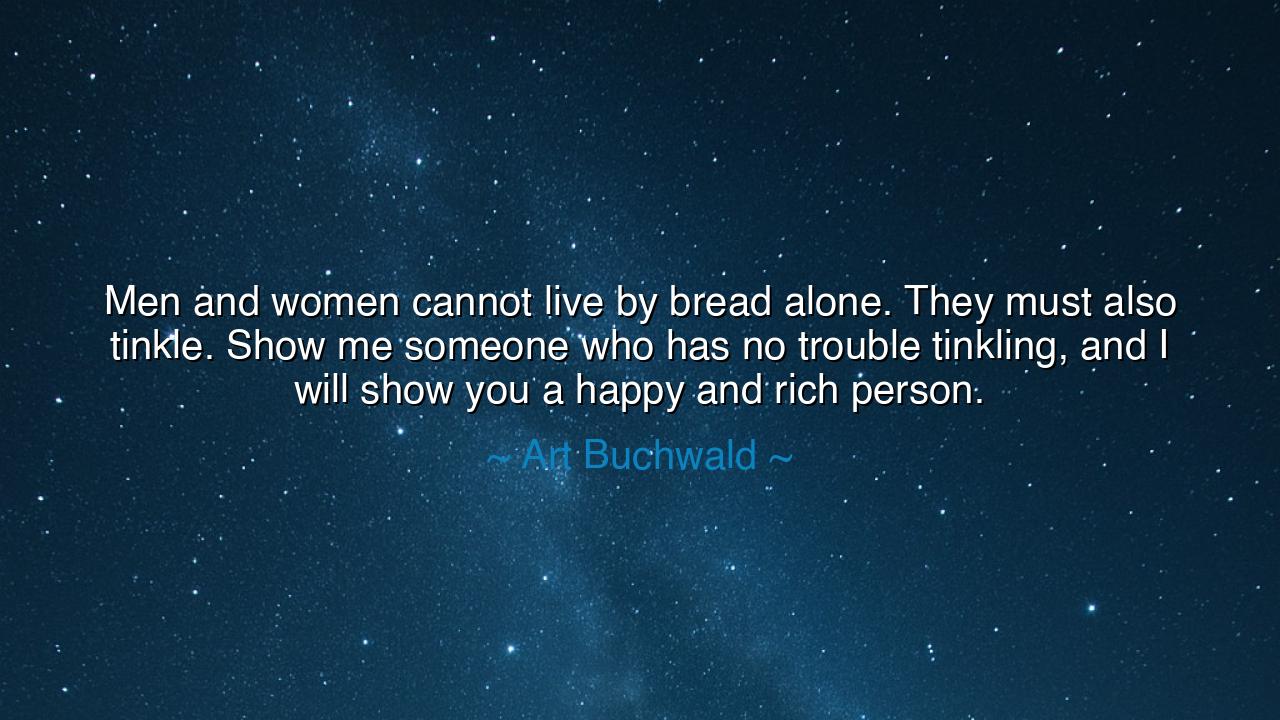
Men and women cannot live by bread alone. They must also tinkle.
Men and women cannot live by bread alone. They must also tinkle. Show me someone who has no trouble tinkling, and I will show you a happy and rich person.






O children of the future, listen to the playful wisdom of Art Buchwald, whose words echo with the truth that life is not sustained by mere bread alone. "Men and women cannot live by bread alone," he said, "they must also tinkle." These words carry a deeper truth—there is more to life than sustenance. While the body may be nourished by food, the soul seeks the joy of laughter, the relief of lighthearted moments, the play that transcends the burdens of daily existence. Without tinkle, that carefree expression of joy and humor, life becomes a grind, a mere survival, rather than a living, breathing dance of spirit and mirth.
In the ancient world, even the greatest leaders and thinkers knew that life could not be all work and struggle. Socrates, the wise philosopher, often engaged in playful dialogues, filled with humor and wit, to draw out the truth in his students. He understood that laughter and joy were essential to a life of wisdom, for the mind grows tired under the weight of endless contemplation. The wise are not those who labor ceaselessly, but those who know the balance between work and play, between the serious and the lighthearted. Art Buchwald reminds us that joy, like bread, is a necessity for a full life.
Consider the example of King Solomon, who, though revered for his wisdom, also recognized the need for enjoyment in life. In the Book of Ecclesiastes, he writes, "To every thing there is a season... a time to weep, and a time to laugh." Even a king, burdened by the weight of ruling, found solace in the simpler pleasures of life. The laughter of friends, the music of the court, and the moments of joy with family were not distractions but vital parts of his reign, refreshing his soul and spirit for the challenges ahead. Solomon understood that a life of joy and laughter was not a sign of weakness, but of wisdom—a lesson we must carry with us.
And yet, Art Buchwald speaks not just of laughter, but of those who live without worry, those who move through the world without the weight of troubles. "Show me someone who has no trouble tinkling, and I will show you a happy and rich person." He speaks of those who have mastered the art of lightness, who can navigate life's trials with ease, finding happiness even in the smallest moments. The carefree ones, who are unburdened by the constant strain of life, seem to possess a treasure far greater than gold. They are the true kings and queens of this world, ruling not with power, but with the gentle grace of contentment.
O children, let us not forget that while bread sustains the body, joy sustains the spirit. It is not enough to simply survive—one must learn to live. Those who laugh, who dance in the face of hardship, who find joy in the simplest of things, are the ones who truly understand the richness of life. Like the great philosophers, kings, and queens of old, let us tinkle and be merry, for in these moments, we touch the divine. The secret to a life well-lived is not found in endless toil, but in the laughter and lightness that nourishes the soul, making every moment worth living.






DTNguyen Duc Thang
Buchwald’s quote is a reminder of how society values comfort and excess. But it also made me wonder—what if 'tinkling' is something more metaphorical? Could it be a stand-in for emotional or creative expression that transcends material wealth? It’s interesting to think that true happiness might come from the ability to live freely and fully, not just from having money. Is it possible to be truly 'rich' in experiences even without financial abundance?
DNNgoc Anh Dao Nguyen
Art Buchwald’s take on happiness seems to emphasize the importance of having more than just the essentials—he’s suggesting that true joy comes from having the freedom to indulge. But is there more to ‘tinkling’ than just wealth and leisure? Can a person find this freedom without financial means, or does it always come back to money? I feel like it raises the question of whether we are conditioned to think happiness is only possible with material wealth.
Nnguyenlinhnga
The quote might be playful, but it really brings attention to the role of leisure in our lives. We often see ‘bread’ as a metaphor for survival, but what about the other things that keep us emotionally and mentally satisfied? Is there something to this idea that a rich, carefree life involves more than just meeting your basic needs? How do we ensure that people can find joy in the small things without wealth being a barrier?
ATNguyen Anh Thu
Buchwald’s quote is amusing, but also makes me think about how much we tie our happiness to money and freedom. Is the ability to 'tinkle' a metaphor for indulgence or fulfillment? It seems like he's saying that those who have financial stability are the ones who can afford true happiness. But does that mean people who struggle financially are incapable of enjoying life in the same way, or do they just find different ways of doing so?
KTTran Le Thi Kim Tien
This quote from Art Buchwald is both humorous and thought-provoking. It seems to suggest that our happiness is tied not just to basic survival needs, but to having the freedom or luxury to enjoy life’s simpler pleasures. Does ‘tinkling’ represent something deeper—like personal enjoyment or leisure? If so, how much do we need material wealth or comfort to access that? I wonder if true happiness lies in the balance between work and play.